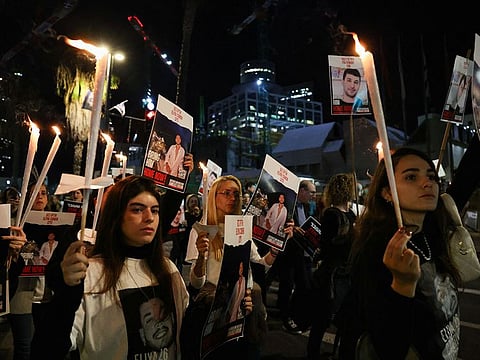What will post-war Israel look like?
Israeli openness to compromise is subject to a realistic and pragmatic Palestinian plan

The question of what post-war Israel will look like is now taking centre stage in all discussions and political analyses. However, delving into this topic is fraught with risks, particularly with expectations of a nuanced and transformative shift in both Israel and Gaza in the aftermath of the war that exceeded more than 100 days, beginning after the events of Oct. 7, 2023.
Analysts either face the risk of succumbing to emotional narratives or leaving critical facts unexplained. The prevailing notion revolves around the transformative impact of the post-war on both Israel and Gaza.
They hold the belief that both Israel and Gaza will undergo significant transformations.
First: Israel’s Supreme Court’s decision last month that struck down a law limiting its powers and supervision over the laws issued by it as the legislative and executive body, and to obligate the two sides to the court’s decisions in case of disagreement, signifies two key points.
Firstly, the court was not under the pressure of the raging war, and secondly, the preference of those who rejected the law and continued to demonstrate for months in the streets before the war, condemning the law, which shields politicians from accountability and elevates their decisions to a supreme status.
The Supreme Court’s ruling itself is a stark reminder of the deep rift within Israeli society before Oct. 7, and its repercussions are likely to persist. After the war, the aggrieved party will strive again to challenge the court and seek to limit its power. Conversely, the benefiting party will prioritise upholding the court’s authority, as it is projected to form a relative majority, as polls say in any forthcoming elections.
On the flip side, the mere submission of a case by South Africa at the International Court of Justice (ICJ), accusing Israel of committing genocide, has significantly harmed Israel’s democratic reputation.
It’s important to note, however, that the practical impact of any decision on the ground may be limited. The perceived weakness of the Israeli legal team and its feeble argument at the ICJ is an indication of Israel’s growing “loss of patience.”

The intersection of three critical factors — the decisions of the Supreme Court, the presentation of humanitarian atrocities during the hearings at the IJC, and the ongoing war — adds complexity to the trajectory of Israel’s future.
The central inquiry tied to these elements revolves around the nature of Israel’s governance. Will it persist as a “democracy,” a label it has long proclaimed and that has garnered sympathy and solidarity globally?
Or is there a potential transformation into a “fascist” state, marked by the expulsion of Palestinians not only from Gaza and the West Bank but also affecting the Arab citizens within the 48 territories, who have historically grappled with second-class citizenship?
Also Read: Egypt’s pragmatic vision for peace in Gaza
Anxious Israeli public
The cultural war within Israeli society is intricately tied to the “fear of the other.” In the aftermath of the war, the internal political conflict is poised to escalate, particularly if the International Court of Justice (ICJ) delivers a negative judgement, even if it is merely procedural.
Anticipating a comprehensive internal investigation into all facets of the war, from negligence in foreseeing the events of Oct. 7 to the fascist nature of the war’s execution and the failure to achieve the declared goals of the war, adds fuel to the already intense flames of internal strife. The investigations may end up not only in large-scale resignations but possibly with judicial and criminal rulings.
Third, the Israeli government’s existing efforts are aimed to prevent or even minimise the impact of the investigations by reaching a victory, such as freeing hostages if possible or assassinating or capturing senior Hamas leaders to bring some victory to the anxious Israeli public.
The division in the Israeli political community is growing between two wings; those who want to find a diplomatic solution to the Palestinian issue and demonstrate their view that despite the difficult war in Gaza, the West Bank is relatively quiet, which is proof that there is a Palestinian wing that wants a peaceful solution. Meanwhile, the second Israeli wing wants and works to demonise the Palestinians, and that none of the Palestinians are angels, and they are all demons!
However, the first wing began to demonstrate its perspective that the price of establishing a Palestinian state (as stated in the Oslo Accords) is much cheaper for Israel than successive wars and also misses an opportunity for hardline regional states to “trade the Palestinian issue” and comfort allies. This is a view that was recently expressed by Israel’s Defence Minister.
Fourth, there is a direct relationship between the shape of the end of the ongoing war and Israel’s political future. Israel appears to lack winning political cards, evident in the statements made by Israel’s lawyer at IJC hearing.
The argument that “the Rafah crossing is Egyptian, and that those who open or close it are the Egyptians” reflects a stance that Israel seems to be in crisis, and this is a complete bankruptcy.
It is widely acknowledged that the entry of humanitarian aid to Gaza is subject to stringent Israeli conditions, including the inspection of any truck by Israel, often leading to bombardment if entered without inspection.
The concept of “unity in wartime,” upon which Israel relied in its previous short-term wars, is beginning to unravel. Some Israelis openly threaten to abandon Israel’s ship of right-wing. The longer the war persists, despite the devastation and human suffering it inflicts, the more constricting the political pressure on extremists becomes.
Perhaps the Israeli public is inclined towards compromise. However, all of this necessitates a Palestinian political plan that accurately interprets the reality and forsakes illusions.
Mohammad Alrumaihi is a thinker, author and Professor of Political Sociology at Kuwait University


